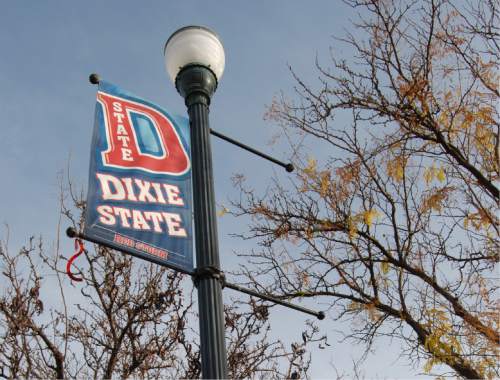This is an archived article that was published on sltrib.com in 2015, and information in the article may be outdated. It is provided only for personal research purposes and may not be reprinted.
If South Carolina can distance itself from the Confederacy, a Dixie State University professor says, Utah should reconsider its connection to the slave-owning South.
Dannelle Larsen-Rife wrote a guest editorial for The Spectrum newspaper this week, suggesting it's time to reconsider the "Dixie" name.
"Sen. Lindsey Graham exhibited pure grace and compassion for the families of those slain in Charleston, South Carolina, and has declared the Confederate flag as a roadblock for the future of his state," she wrote.
Since the slaying of nine churchgoers in a racially motivated attack in June, leaders throughout the South are asking that emblems associated with slavery, including the Confederate flag, be removed.
But in Utah, Larsen-Rife may face significant pushback from her university community.
Many in St. George believe the issue was resolved when Gov. Gary Herbert signed legislation making the college a full-fledged university in early 2013.
"That's when the whole name issue was decided and we turned the page and moved on," said Steve Johnson, university public relations director.
When Dixie State College was transitioning to a university and exploring potential names, a whopping 83 percent of those interviewed by a consultant wanted to keep the name Dixie, he noted.
Over the past two decades, the southern Utah school has taken steps to "dismantle and retire" its rebel identity, including renaming the athletic teams from "Rebels" to "Red Storm" and pulling a statue of Confederate boy soldiers from campus in 2012. It was sent back to the artist earlier this year.
Dixie State, Johnson says, has "no plans of revisiting and changing the institution's name."
But Larsen-Rife believes recent events have changed things, that many at the university support eliminating any remaining vestiges of the South.
"This is not about political correctness. It's about a public institution having a name associated with hate crimes," she said.
"In southern Utah, Dixie is an affectionate term … of acquired identity and history. I respect what it means to people," the associate professor said. "However, to people outside of Utah, it means something entirely different."
Just as the swastika is ruined as a symbol for anything but Hitler's racial purification, the name Dixie is ruined by its association with the Confederacy's slavery, she said.
The Dixie name hurts the university as it tries to recruit faculty, she said. "We need to have a serious conversation about it."
Larsen-Rife said she wrote her editorial as an individual, not as a faculty member. She stepped down as chairwoman of the psychology department on June 30 after four years. She remains an assistant professor at the St. George-based university.
Advocates for keeping the Dixie name in 2013 noted that the name stemmed from a Church of Jesus Christ of Latter-day Saints mission to grow cotton in the 1800s. Some of the area's early settlers were former slave owners and slave drivers.
Johnson said the suggestion to change the name was mentioned, but not considered a priority in the nine months of strategic planning that started late last year after Richard "Biff" Williams became university president in August.
The draft plan is in the final stages and will be released for public comment in several weeks, he said. It will not include a proposed name change.
Larsen-Rife notes in her guest editorial that the university has not entirely left behind its former identity, pointing to the words "Rebels Forever," etched in concrete on a campus monument.
Johnson said those words are part of a Dixie Alumni Association memory garden erected in 2012.
"They named it in honor of their time here," he said.
Twitter: @KristenMoulton



